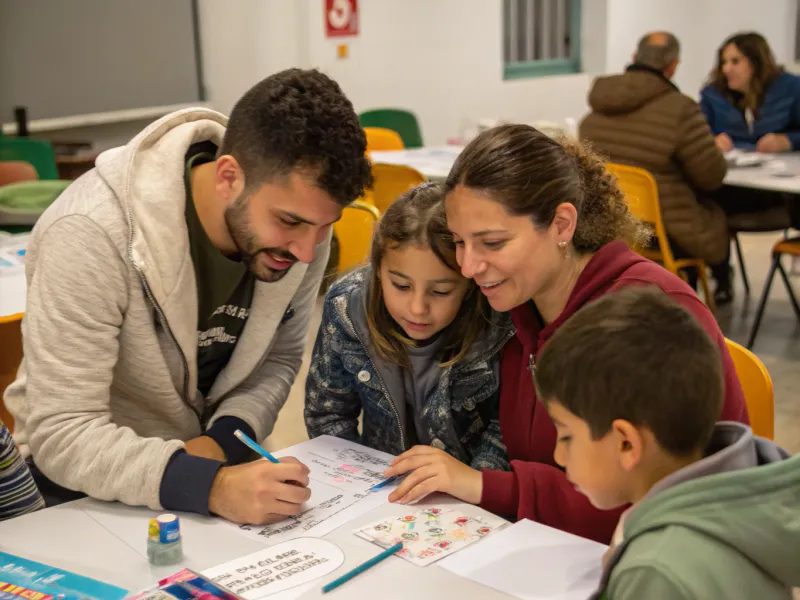33 Ways to Stay Close to Your Kids as They Grow Older

As a family therapist, I’ve seen firsthand how the relationship between parents and children evolves as children grow. Closeness is not about control, but about cultivating mutual respect, communication, and emotional connection.
You might find it challenging to adapt as your children gain independence, but the bond doesn’t have to weaken. Instead, it can transform into something more profound and rewarding.
Here are 33 ways you can maintain a strong, loving relationship with your children as they navigate their own paths.
1. Respect Their Independence

Respecting your child’s independence is crucial as they grow. It can be tempting to want to control their choices, out of love and concern, but it’s essential to recognize that allowing them to make their own decisions fosters growth. This doesn’t mean stepping back entirely, but rather being a guiding presence. Your role shifts from decision-maker to supporter, ensuring that they know you’re there if they need guidance.
When you respect their independence, you communicate trust. Trust is foundational in maintaining a strong bond. It tells your child that you believe in their ability to navigate life’s challenges. This doesn’t just strengthen their self-confidence, but also reassures them that home is a safe place where they can return for understanding and support.
Embrace this change by celebrating their milestones and new experiences. Attend events that matter to them, even if they seem trivial to you. Show interest in their passions, and be ready to learn about their world. This mutual respect and understanding will enhance your relationship, building a lasting emotional connection that can adapt to life’s various stages.
See also: 25 Ways Parents Push Their Adult Children Away (And How to Fix It)
2. Listen More Than You Advise

Listening is an underrated yet powerful tool in maintaining a close relationship with your children as they grow older. Often, as parents, our instinct is to guide and advise, but as children mature, they need someone who listens more than they need unsolicited counsel. This shift requires you to embrace patience and openness.
When you listen actively, you show your child that their thoughts and feelings are valued. This fosters a safe space for them to express themselves without fear of judgment or correction. Remember, they are navigating complex emotions and situations, and sometimes all they need is to feel heard. Reassure them that it’s okay to share their fears, ambitions, and even failures, and that you’re there to support them regardless.
Active listening also involves empathy and understanding. Instead of preparing your next piece of advice as they speak, focus on what they’re saying and how they’re saying it. Mirroring their feelings and asking open-ended questions can encourage deeper conversations. By showing that you value their voice, you strengthen your connection, making them more likely to turn to you when they truly need guidance.
3. Support Their Dreams

Supporting your child’s dreams, even when they differ from your own expectations, is vital in maintaining a strong relationship as they grow. It can be difficult to reconcile your hopes with their aspirations, but celebrating their passions is key to fostering a loving bond.
Every child has unique talents and dreams, and your role is to nurture these interests. Even if their chosen path seems unfamiliar or risky, encourage their pursuits and show genuine enthusiasm for their achievements. This unwavering support reinforces your belief in their capabilities and helps them flourish.
Engage with their interests by asking questions and participating in related activities. Attend their events, listen to their ideas, and offer resources that might aid their journey. By backing their dreams, you demonstrate unconditional love and trust in their judgment. This approach not only solidifies your relationship but also empowers them to pursue their passions with confidence, knowing they have your support.
4. Adjust Your Expectations

Adjusting your expectations is an essential part of staying close to your children as they grow older. The role of a parent evolves over time, and holding onto rigid expectations can create unnecessary tension. Understanding that your child’s path may differ from what you envisioned is crucial.
Embrace the idea that your child is an individual with unique preferences and aspirations. Allow them the space to explore their identity without the pressure of meeting preconceived standards. This flexibility in expectations fosters a sense of freedom and acceptance, reassuring them that your love is constant, regardless of their choices.
Reflect on your expectations and communicate openly with your child about theirs. Encourage a dialogue where both parties can express hopes and concerns. This mutual understanding helps in building a relationship based on respect and openness. By adjusting your expectations, you not only alleviate stress but also create an environment where your child feels supported and valued, thus strengthening your bond.
5. Be Open to New Ways of Connecting

Being open to new ways of connecting with your children is key as they grow older. The dynamics of communication have evolved, and adapting to these changes can help maintain a strong bond. Be willing to explore different methods, whether it’s through texting, video calls, or shared online activities.
While traditional face-to-face conversations are valuable, incorporating modern communication tools can make interactions more frequent and convenient. Respect their preferred modes of communication—this shows that you’re interested in engaging with them on their terms. Embrace technology as a bridge, not a barrier.
Explore shared interests through online platforms, or schedule virtual hangouts if distance is a factor. These efforts demonstrate your willingness to adapt and stay involved in their lives, regardless of physical proximity. By being open to new ways of connecting, you not only uphold your relationship but also show that maintaining closeness is a priority, no matter the medium.
6. Apologize When Necessary

Apologizing when necessary is a powerful way to maintain a close relationship with your children as they mature. It’s a common misconception that parents must always be right, but acknowledging your mistakes can significantly strengthen your bond.
When you apologize, you demonstrate humility and respect. This act teaches your child that everyone is fallible, and owning up to errors is a sign of strength, not weakness. By admitting when you’re wrong, you build an environment of mutual respect and trust, making your child feel valued and understood.
Sincere apologies also open the door to meaningful conversations and resolutions. They show your child that you’re committed to improving the relationship and willing to address issues constructively. This transparency fosters a safe space for open dialogue, encouraging your child to also express their feelings and concerns. Embrace the power of apology to reinforce a strong, trusting relationship that can navigate the challenges of growing up.
7. Give Advice Only When Asked

Giving advice only when asked is vital to maintaining a respectful relationship with your maturing child. As they grow older, their desire for independence increases, and unsolicited advice can sometimes feel like overreach. This doesn’t mean you should withhold guidance, but rather offer it when it’s sought.
Respect their autonomy by allowing them to come to you when they’re ready for input. This approach not only respects their personal growth but also empowers them to make decisions. When they seek your advice, they’re more likely to be receptive, knowing it’s something they’ve requested, not imposed.
Maintain an open-door policy where your child knows they can approach you anytime. Encourage open-ended conversations that allow them to explore their thoughts and ideas. By being a supportive figure rather than an authoritative voice, you cultivate a trusting relationship. This dynamic helps your child feel secure in their independence while knowing they have a reliable source of wisdom and support when needed.
8. Celebrate Their Successes

Celebrating your child’s successes, without making it about your parenting, is crucial in maintaining a strong, loving relationship. Acknowledging their achievements while keeping the focus on their efforts reinforces their autonomy and self-worth.
When you celebrate their milestones, express genuine pride in their accomplishments. Whether it’s a big win or a small victory, your enthusiasm and acknowledgment are powerful affirmations of their hard work and talents. This approach fosters a positive environment where your child feels appreciated and motivated to pursue their passions.
Avoid framing their success as a reflection of your parenting. Instead, highlight their perseverance, creativity, and dedication. By doing so, you empower them to own their achievements and build confidence in their abilities. This shift in focus strengthens your bond, showing your child that your love and pride are unconditional and not contingent upon their accomplishments.
9. Respect Their Partners and Friendships

Respecting your child’s partners and friendships is a crucial aspect of maintaining a close relationship as they grow older. Their social circle is an extension of their life, and your acceptance of these relationships can significantly impact your bond.
Show genuine interest in their friends and partners by engaging in conversations and inviting them to family events. This openness communicates that you value their choices and the people they care about. Avoid making judgments or comparisons, as this can create tension and alienation.
Embrace the diversity of their social interactions and allow them the space to build meaningful connections. By respecting these relationships, you demonstrate trust and acceptance, reinforcing your support for their independence. This respect fosters an inclusive environment where your child feels understood and appreciated, strengthening your connection.
10. Continue Creating Traditions

Continuing to create traditions is a wonderful way to maintain a close bond with your children as they grow older. Traditions, whether new or old, provide a sense of continuity and belonging that transcends the passage of time.
As your children mature, involve them in the evolution of these traditions. Encourage them to take an active role in planning and executing family events. This collaboration allows them to feel valued and included, strengthening their connection to family.
Be open to adapting traditions to accommodate changing dynamics and interests. This flexibility shows that you respect their growth and are willing to embrace new ideas. By maintaining and evolving family traditions, you create lasting memories and foster a sense of unity, reinforcing the emotional bond between you and your child.
11. Encourage Emotional Expression

Encouraging emotional expression is vital in maintaining a close relationship with your children as they grow. As they navigate the complexities of life, having a safe space to express their emotions is crucial.
Promote open conversations where your child feels comfortable sharing their feelings without fear of judgment. Validate their emotions and offer guidance when needed. This approach fosters a trusting environment where they know they can turn to you for support.
Encourage them to label and articulate their emotions, which enhances emotional intelligence. By modeling emotional openness yourself, you set a powerful example. This mutual exchange of emotions strengthens your connection, reinforcing a bond built on understanding and empathy.
12. Be Patient with Their Growth

Being patient with your child’s growth is essential for maintaining a strong relationship. As they mature, their journey will involve both triumphs and setbacks. Your patience serves as a steady reassurance that you are there for them, regardless of the pace or direction of their development.
Recognize that growth is not linear. There will be moments of rapid advancement and times of seeming stagnation. Avoid pressuring them to meet specific timelines or achievements. Instead, celebrate the individual steps they take, acknowledging that each one contributes to their overall journey.
Patience also means allowing them the space to explore and learn from their mistakes. Your understanding and support provide a foundation of security, encouraging them to take risks and grow. This approach strengthens your bond, showing your child that your love is unwavering and not dependent on their accomplishments.
13. Share Your Stories and Experiences

Sharing your stories and experiences can help maintain a close relationship with your children as they grow. By opening up about your own life, you create a sense of connection and relatability that transcends generations.
Discussing your triumphs and challenges provides valuable lessons and insights for your child. It shows them that you too have faced similar situations and have grown from them. This transparency fosters a deeper understanding and trust, encouraging them to share their own experiences with you.
Balance is key; avoid overwhelming them with unsolicited advice. Instead, let your stories serve as a guide, offering perspective without overshadowing their own journey. This mutual exchange strengthens your bond, building a relationship based on shared experiences and empathy.
14. Embrace Change Together

Embracing change together is crucial for maintaining a strong relationship with your children as they grow. Life is full of transitions, and facing them as a team can strengthen your bond.
Show openness and adaptability as life circumstances evolve. Whether it’s moving to a new city, changing schools, or shifting family dynamics, approach these changes with a positive attitude. Encourage your child to express their feelings about these transitions, and validate their emotions.
View change as an opportunity for growth and learning. By facing it together, you demonstrate that you are a united front, ready to tackle challenges and celebrate triumphs. This shared journey reinforces your connection, showing your child that no matter what changes occur, your support remains constant.
15. Promote Health and Well-Being

Promoting health and well-being in your family is vital for maintaining a close relationship as your children grow. Encourage habits that foster physical, mental, and emotional health, creating a foundation for lifelong wellness.
Engage in activities that promote a healthy lifestyle, such as cooking nutritious meals together or participating in regular exercise. This collaboration not only improves well-being but also strengthens family bonds through shared experiences.
Support mental health by encouraging open conversations about stress, emotions, and challenges. Provide resources and guidance when needed, demonstrating that well-being is a priority. This holistic approach fosters a supportive environment where your child feels cared for and understood, fortifying your connection.
16. Allow Them to Fail and Learn

Allowing your child to fail and learn from their experiences is essential in maintaining a close relationship as they grow. Failure is a natural part of life, and how they navigate setbacks can significantly impact their development.
Resist the urge to shield them from every mistake. Instead, offer support and guidance as they learn from their experiences. Encourage them to view failures as opportunities for growth, helping them build resilience and confidence.
Create an environment where mistakes are seen as valuable lessons rather than shortcomings. This approach fosters a culture of learning and adaptability, showing your child that you are there for them, regardless of the outcome. By supporting their journey of growth, you strengthen your bond, demonstrating unconditional love and understanding.
17. Keep Communication Open

Keeping communication open is a cornerstone of maintaining a close relationship with your children as they grow. Open and honest dialogue fosters trust, understanding, and connection.
Encourage regular conversations that go beyond surface-level exchanges. Ask open-ended questions that invite them to share their thoughts and feelings. Listen actively and empathetically, showing that you value their perspective.
Be mindful of the balance between guiding and controlling conversations. Allow them to lead discussions on topics important to them. This openness demonstrates your respect for their individuality and encourages them to come to you with their joys and struggles. By prioritizing open communication, you build a relationship based on mutual respect and trust.
18. Show Interest in Their Hobbies

Showing interest in your child’s hobbies is an effective way to maintain a strong relationship as they grow. Their interests provide insight into their personality and passions, and your engagement can significantly enhance your bond.
Participate in activities they enjoy, whether it’s learning a new skill together or attending events related to their hobbies. This involvement shows that you value their interests and are willing to invest time and effort to understand their world.
Your curiosity and support affirm their choices and make them feel seen and appreciated. This mutual engagement fosters a deeper connection, demonstrating that your love and support extend beyond traditional parental roles. By embracing their hobbies, you create shared experiences and memories, strengthening your relationship.
19. Maintain Your Own Interests and Identity

Maintaining your own interests and identity is crucial for a healthy relationship with your children as they grow. While it’s important to be involved in their lives, preserving your individuality sets a positive example.
Pursuing your passions and hobbies demonstrates that personal growth is a lifelong journey. It shows your child that a fulfilling life includes both family and personal interests. This balance promotes respect for each other’s autonomy and encourages mutual support.
Share your experiences and achievements with your child, inviting them to be part of your journey. This reciprocal relationship fosters mutual appreciation and understanding. By maintaining your own identity, you reinforce the idea that while family is central, individual growth is equally important, strengthening the bond with your child.
20. Be Consistent with Boundaries

Being consistent with boundaries is essential for maintaining a strong relationship with your children as they grow. Clear boundaries provide a sense of security and stability, essential for healthy development.
Discuss and establish boundaries together, ensuring they are reasonable and mutual. This collaborative approach fosters respect and understanding, showing your child that their input is valued and considered.
Consistency is key; enforce boundaries fairly and compassionately. This reliability reassures your child of your commitment to their well-being, reinforcing your role as a supportive and dependable figure. By maintaining consistent boundaries, you build a relationship based on respect, trust, and mutual understanding.
21. Express Love Freely

Expressing love freely is a fundamental aspect of maintaining a close relationship with your children as they grow. Love is the foundation of your bond, and regularly affirming it strengthens your connection.
Show your love through words and actions. Simple gestures of affection, acts of kindness, and verbal affirmations remind your child that they are cherished. This consistent expression of love provides emotional security and reinforces your dedication to the relationship.
Be mindful of their preferred ways of receiving love, adjusting your expressions to suit their comfort. Whether it’s through physical affection, quality time, or supportive words, ensure that your love is palpable in their daily lives. By expressing love freely and authentically, you nurture a strong, lasting bond built on trust and affection.
22. Attend Their Important Events

Attending your child’s important events is a vital way to maintain a close relationship as they grow. Your presence at significant moments in their life communicates support, pride, and love.
Make an effort to attend their milestones, be it academic, athletic, or personal achievements. Your attendance shows that you value their efforts and accomplishments, reinforcing their sense of self-worth and confidence.
Celebrate both big and small victories with genuine enthusiasm. Your involvement in their journey fosters a sense of belonging and appreciation, strengthening your bond. By being present at their important events, you demonstrate your unwavering support and affirmation of their journey.
23. Foster a Sense of Humor

Fostering a sense of humor is a delightful way to maintain a close relationship with your children as they grow. Laughter creates joyful memories and builds emotional connections, enhancing your bond.
Encourage lightheartedness and fun in everyday interactions. Share jokes, watch comedies, or engage in playful activities that bring laughter. This approach helps alleviate stress and creates a positive atmosphere.
A shared sense of humor can also provide perspective during challenging times. It reminds your child that life doesn’t always have to be serious and that laughter can be a source of strength and resilience. By fostering humor, you create a nurturing and enjoyable environment that strengthens your relationship.
24. Prioritize Family Time

Prioritizing family time is essential for maintaining a strong relationship with your children as they grow. Regular family interactions reinforce love, support, and understanding.
Schedule dedicated time for family activities that everyone enjoys. Whether it’s a weekly dinner, a weekend outing, or a simple game night, these moments create lasting memories and fortify familial bonds.
Encourage participation from all family members, fostering a sense of unity and belonging. This collective involvement enhances communication and mutual respect, strengthening your connection. By prioritizing family time, you affirm the importance of togetherness, nurturing a strong, supportive relationship.
25. Be a Role Model

Being a role model is a powerful way to maintain a close relationship with your children as they grow. Your actions and values significantly influence their development and character.
Demonstrate behaviors you wish to instill in your child, such as kindness, integrity, and responsibility. Your consistent example sets a standard for them to emulate, reinforcing the importance of these values.
Share your experiences and lessons learned, providing guidance and inspiration. This transparency fosters trust and respect, encouraging your child to follow your lead. By being a positive role model, you strengthen your bond, showing your child that your relationship is built on mutual respect and shared values.
26. Support Their Education and Career Choices

Supporting your child’s education and career choices is crucial for maintaining a strong relationship as they grow. Your encouragement and understanding bolster their confidence and independence.
Engage in conversations about their aspirations, offering guidance and resources when needed. Show interest in their chosen path, regardless of whether it aligns with your own expectations. This support communicates trust and belief in their abilities.
Celebrate their achievements and milestones, reinforcing their sense of accomplishment. Your faith in their potential empowers them to pursue their goals with confidence. By supporting their education and career choices, you strengthen your bond, demonstrating unconditional love and respect for their journey.
27. Be Mindful of Your Influence

Being mindful of your influence is important for maintaining a strong relationship with your children as they grow. Your words and actions impact their self-esteem, values, and decisions.
Reflect on how your behavior and beliefs shape their perceptions. Strive to provide positive reinforcement and encourage critical thinking. This awareness fosters a nurturing environment where your child feels supported and empowered.
Recognize that your influence should guide rather than control. Encourage them to explore their own beliefs and values, offering guidance without imposing your own views. By being mindful of your influence, you cultivate a relationship built on respect and independence, strengthening your connection.
28. Encourage Problem-Solving Skills

Encouraging problem-solving skills is key to maintaining a strong relationship with your children as they grow. This approach fosters independence and confidence, essential traits for navigating life’s challenges.
Provide opportunities for your child to tackle problems independently, offering support and guidance when needed. Encourage them to explore different solutions and learn from their experiences.
Engage in activities that promote critical thinking and creativity, such as puzzles or strategic games. This involvement demonstrates your investment in their growth and development. By encouraging problem-solving skills, you empower your child to make informed decisions, reinforcing your bond through mutual respect and trust.
29. Adapt to Their Evolving Needs

Adapting to your child’s evolving needs is crucial for maintaining a strong relationship as they grow. Their requirements change over time, and your flexibility demonstrates understanding and support.
Stay attuned to their preferences and boundaries, adjusting your approach as necessary. This adaptability shows that you respect their growth and are committed to meeting their needs.
Encourage open communication about their evolving expectations and desires. This dialogue fosters mutual respect and understanding, strengthening your bond. By adapting to their needs, you create a supportive environment where your child feels valued and understood, reinforcing your connection.
30. Provide a Safe Space for Vulnerability

Providing a safe space for vulnerability is essential for maintaining a close relationship with your children as they grow. This environment encourages open communication and emotional connection, crucial for a strong bond.
Create a supportive atmosphere where your child feels comfortable expressing their fears, insecurities, and emotions. Validate their feelings and offer reassurance without judgment.
Be an empathetic listener, offering understanding and comfort. This compassionate approach fosters trust and security, encouraging your child to turn to you in times of need. By providing a safe space for vulnerability, you nurture a relationship built on empathy and understanding, strengthening your connection.
31. Encourage Lifelong Learning

Encouraging lifelong learning is a powerful way to maintain a strong relationship with your children as they grow. This shared pursuit fosters mutual growth and understanding.
Promote curiosity and exploration by engaging in educational activities as a family. Attend workshops, visit museums, or participate in classes together. This collaborative approach reinforces the value of learning.
Share your own learning experiences and encourage them to pursue their interests. This mutual exchange fosters respect and admiration, strengthening your bond. By encouraging lifelong learning, you create a dynamic relationship that evolves with your child’s growth and curiosity.
32. Celebrate Their Individuality

Celebrating your child’s individuality is essential for maintaining a strong relationship as they grow. Embrace their unique traits and personalities, reinforcing their sense of self-worth and confidence.
Acknowledge their differences and encourage them to express themselves freely. This acceptance fosters a supportive environment where they feel valued and understood.
Encourage their unique talents and interests, celebrating their achievements and milestones. By honoring their individuality, you demonstrate unconditional love and support, strengthening your bond through acceptance and appreciation. This approach reinforces your role as a nurturing and affirming presence in their life.
33. Encourage Them to Give Back

Encouraging your child to give back to their community is a meaningful way to maintain a close relationship as they grow. This shared value fosters empathy, responsibility, and connection.
Participate in volunteer activities as a family, promoting the importance of community engagement. This collective involvement reinforces the value of giving back and strengthens your family bond.
Encourage your child to explore causes they are passionate about, offering support and resources. This empowerment fosters independence and compassion, reinforcing your connection. By encouraging them to give back, you cultivate a relationship based on shared values and mutual growth.
